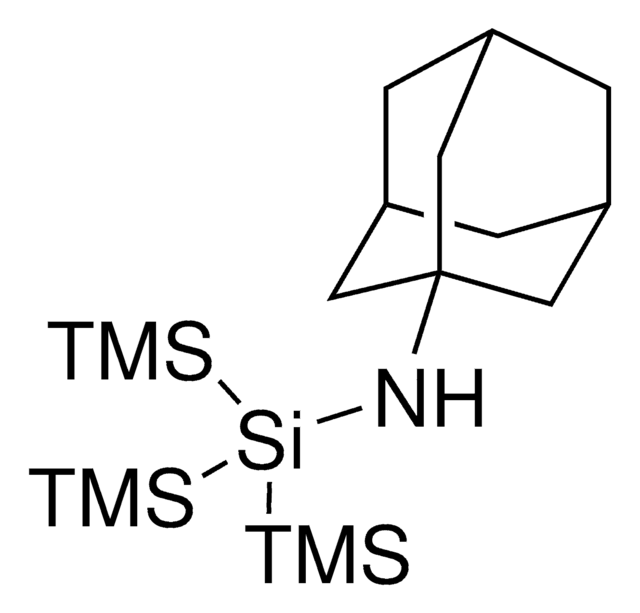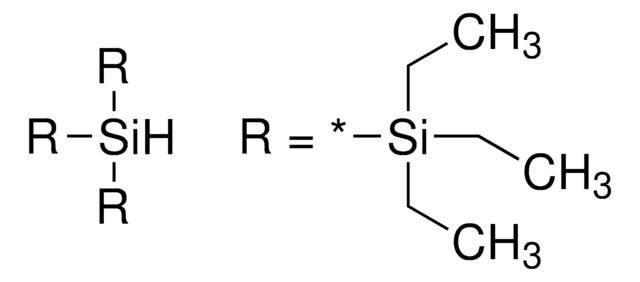360716
Tris(trimethylsilyl)silane
97%
Synonyme(s) :
1,1,1,3,3,3-Hexamethyl-2-trimethylsilyl-trisilane, TTMSS
About This Item
Produits recommandés
Niveau de qualité
Pureté
97%
Forme
liquid
Pertinence de la réaction
reagent type: reductant
Indice de réfraction
n20/D 1.489 (lit.)
Point d'ébullition
73 °C/5 mmHg (lit.)
Densité
0.806 g/mL at 25 °C (lit.)
Chaîne SMILES
C[Si](C)(C)[SiH]([Si](C)(C)C)[Si](C)(C)C
InChI
1S/C9H28Si4/c1-11(2,3)10(12(4,5)6)13(7,8)9/h10H,1-9H3
Clé InChI
SQMFULTZZQBFBM-UHFFFAOYSA-N
Vous recherchez des produits similaires ? Visite Guide de comparaison des produits
Description générale
Application
Used in:
- Hydrosilylations
- Radical reactions
- Reductions of acid chlorides
- Reductions of carbon-halogen bonds
- Hydrosilations of carbonyls
- Another common application involves the use of the tris(trimethylsilyl)silyl (TTMSS, or super silyl) group when complexed with transition metals and main group elements
- More recently, the super silyl group is being utilized in carbon–carbon bond forming reactions
Mention d'avertissement
Warning
Mentions de danger
Conseils de prudence
Classification des risques
Flam. Liq. 3
Code de la classe de stockage
3 - Flammable liquids
Classe de danger pour l'eau (WGK)
WGK 3
Point d'éclair (°F)
131.0 °F - closed cup
Point d'éclair (°C)
55 °C - closed cup
Équipement de protection individuelle
Eyeshields, Faceshields, Gloves, type ABEK (EN14387) respirator filter
Faites votre choix parmi les versions les plus récentes :
Déjà en possession de ce produit ?
Retrouvez la documentation relative aux produits que vous avez récemment achetés dans la Bibliothèque de documents.
Les clients ont également consulté
Articles
Explore methods for molecular monolayers on silicon surfaces, their properties, and applications in molecular electronics and sensing.
Explore methods for molecular monolayers on silicon surfaces, their properties, and applications in molecular electronics and sensing.
Explore methods for molecular monolayers on silicon surfaces, their properties, and applications in molecular electronics and sensing.
Explore methods for molecular monolayers on silicon surfaces, their properties, and applications in molecular electronics and sensing.
Contenu apparenté
The Yamamoto group has employed several applications in catalysis.
Notre équipe de scientifiques dispose d'une expérience dans tous les secteurs de la recherche, notamment en sciences de la vie, science des matériaux, synthèse chimique, chromatographie, analyse et dans de nombreux autres domaines..
Contacter notre Service technique

![(Ir[dF(CF3)ppy]2(dtbpy))PF6](/deepweb/assets/sigmaaldrich/product/structures/982/913/02dd8ddd-6deb-40a0-ab9b-07b18f1abb09/640/02dd8ddd-6deb-40a0-ab9b-07b18f1abb09.png)


![[4,4′-Bis(1,1-dimethylethyl)-2,2′-bipyridine] nickel (II) dichloride](/deepweb/assets/sigmaaldrich/product/structures/471/091/6faa29b1-bf8a-4d87-90b2-4cc55e082620/640/6faa29b1-bf8a-4d87-90b2-4cc55e082620.png)





